Afghanistan War, Civil Liberties, Criminalizing Dissent, Human Rights, Surveillance, Truth to Power
Podcast: Play in new window | Download
Hosts Updates:
——————-

Mumia Exception: Supreme Court Denies Appeal For Mumia Abu-Jamal
In early April the Supreme Court denied a petition for writ of certiorari in the longstanding case of Mumia Abu Jamal. The appeal to the high Court included an examination of the so-called culture of discrimination operative among Philadelphia prosecutors. It cited 11 separate rulings in which federal and Pennsylvania state courts specifically faulted Philadelphia prosecutors for engaging in intentional discrimination during jury selection. Mumia Exception
Citing dozens of court rulings nationwide, it noted a U.S. Supreme Court ruling where one justice used a statistical study documenting Philadelphia prosecutors purging potential Black jurors at twice the rate of whites during death penalty trials between 1981 and 1997.
Linn Washington:
- Courts, be they city courts in Philadelphia, apellate courts in Pennsylvania or federal courts at the trial level and appeals level,
- they will either ignore or alter their established rulings, their precedent . . .when it comes to the Mumia case.
- In Mumia’s case, we have a situation where police actually, withheld evidence, they altered evidence, we now know this clearly, but the courts have helped suppress that
- Prison authorities have barred photographing or recording for broadcast purposes of inmates in institutions, just as a way to get at Mumia. You can go in with a notebook and pen.
- Batson Case: In the first 3 years of prosecution in Mumia’s trial, there was deliberate purging of black people from the jurors, for racially discriminatory purposes.
- A video tape had surfaced of a training session, a formal training session in the office, where a senior prosecutor was instructing other prosecuters, on how to purge blacks for juries, in a way that it would mask what they’re doing and thus get around the Batson ruling.
- In March 2008, the US Supreme Court issued relief to an inmate on death row in Louisiana, citing Batson, the essence of it was, if there was one provable instance of discrimination against a black juror – you would have a new trial.
- Two months later, the US Third Circuit, ignored that ruling and created new law, new restriction, higher burden for inmates to raise, in Batson cases.
- Justice Samuel Alito had initially ruled if one legal juror was discriminated against, it was provable, . . to get a new trial – Batson case. Then he changed his view.
- Here we had an award winning journalist, at that time the head of the black journalist association in Philadelphia.
- This has been fascinating in terms of the police withholding evidence, perjury, intimidating witnesses, prosecuters engaged in egregious misconduct and judges from the trial court level, all the up to the US Supreme Court ignoring their duty to justice
- Regarding Judge Sabo’s remark ” to fry that n-word” a court stenographer overheard this and years later came forward to make it public.
Guest – Linn Washington is an Associate Professor of Journalism at Temple University in Philadelphia and a weekly columnist for The Philadelphia Tribune – America’s oldest black owned newspaper. He has reported on the Abu-Jamal case for nearly thirty years. Linn Washington is currently writing a book on police brutality, the thesis is why we have police brutality. We have a continuation of police brutality decade after decade because prosecutors actually aid by ignoring the misconduct of officers.
————–

Leonard Peltier: Update On A Political Prisoner
Leonard Peltier is a Native American activist who was convicted of killing two FBI agents during a shootout on the Pine Ridge Indian Reservation in 1975. He was recently transferred back to prison in Lewisburg, Pennsylvania after being attacked and beaten. Leonard Peltier was also denied clemency by the Bush Administration, the request had been pending for 8 years. He is featured in the recently published book, Let Freedom Ring, A Collection of Documents From the Movements to Free US Political Prisoners, brings together the voices of numerous US political prisoners who have taken great risk and sacrifice to stand up for human and civil rights.
Political prisoners such as Leonard Peltier, receive some of the harshest treatment behind bars, such as torture, inhumane and degrading treatment, they’re also subjected to disproportionately lengthy prison sentences. Attorney Michael Kuzma will give us an update on Leonard Peltier’s current condition and case.
Michael Kuzmar
- Two FBI agents, Kohler and Williams allegedly had a warrant they were trying to serve on Jimmy Eagle, who had allegedly stolen some cowboy boots. They went to execute the warrant, a fire fight erupted and the next thing you know, Joe Stunts and the two agents are dead. Subsequently, Leonard Peltier, Bob Robado, Dino Butler, were charged with murdering the two agents.
- For Leonard Peltier’s case it was tragic in that the lead attorney Eliot Takiff, had never tried a murder case before, you had an unfriendly judge and the prosecutors had a field day with ramping up the fear.
- When Bill Kunstler picked up the case on a Habeas, after losing appeals. It was about the bullet not matching.
- There was a balistics report that was withheld from defense attorneys in 1977, it was later unearthed by John Privatera and Michael Tigar.
- When Leonard was arrested on February 6, 1976, he was with an individual named Frank Blackhorse. Blackhorse was wanted for several offenses and indicted in 1973 for wounding at FBI agent at Wounded Knee.
- The most curious thing about this case is that Frank Blackhorse is not extradicted, he’s allowed to roam free in Western Canada. Turns out also, Frank Blackhorse isn’t his real name.
- The head of security for the American Indian Movement was a paid FBI operative.
- Based on the work I’ve done with the FOIA requests, its clear that along with others in the AIM, Leonard Peltier had been targeted by the FBI under Cointel Pro.
- We’ve been fighting to get documents that show how the FBI used a host of dirty tricks against Leonard.
- One of the prosecutors who is now retired, Len Krooks, has publicly stated that they don’t know who shot the agents.
- What we discovered is that the government turned over 3500 pages of material to Leonard’s defense attorneys and said this is all we have. As a result of a FOIA case brought in the late seventies we discovered the FBI had 18 thousand pages of material.
- Twelve thousand pages were released, 6 thousand pages withheld. Then as a result of another FOIA request in 2001 we found the FBI had 142, 579 pages of material.
- We have a suit still pending, we’re waiting for a decision from the court of appeals, for the 8th circuit. We’re trying to get 90 thousand pages, that’s what we’re sueing for. The government is fighting to hold onto 11 thousand pages of material. The reason they say is that the material if released will hamper the nation’s war on trans-national terrorism.
- The FBI can’t afford to have this information come out, because if people learned how extensive the informants and under cover agents were
- Leonard Peltier will be 65 on September 12, 2009. He has diabetes, his eyesight is not the best. There’s no threat whatsoever if Leonard was released today. William Kunstler believed Peltier did not shoot the FBI agents.
- Leonard is considered to be an old law inmate.
- Leonard had been in Ft. Leavenworth Prison and was transferred to the Lewisburg Federal Penitentiary. He was then transfere
- January 13th. Leonard was brutally attacked by two other inmates and suffered a possible concussion, he was kicked around the ribcage, he’s having headaches, his knee was bruised.
- What we’ve been hoping to do is get Leonard transferred to a medium security prison, he’s eligible.
Guest – Michael Kuzma, attorney for Leonard Peltier. As many know, Leonard Peltier is a Native American activist who was convicted of killing two FBI agents during a shootout on the Pine Ridge Indian Reservation in 1975. He was recently transferred back to prison in Lewisburg, Pennsylvania after being attacked and beaten. Leonard Peltier was also denied clemency by the Bush Administration, the request had been pending for 8 years.
——————————————————————-
Afghanistan War, CIA Sponsored Terror, Civil Liberties, Extraordinary Rendition, Guantanamo, Habeas Corpus, Human Rights, Iraq War, Military Tribunal, Targeting Muslims, Torture, Truth to Power
Podcast: Play in new window | Download
Host Updates
———
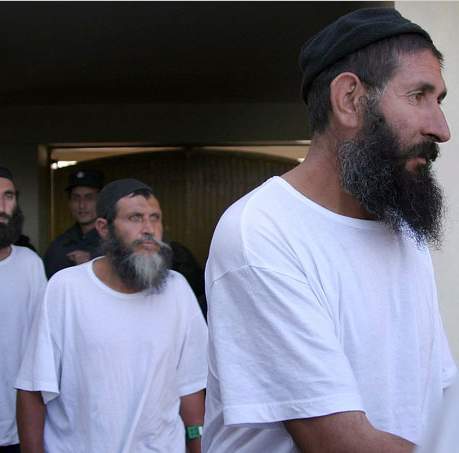
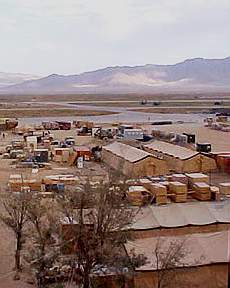

Some Prisoners at Bagram AFB, Afghanistan May Challenge Detention
Last week a federal judge ruled that some prisoners held by the US military at Bagram Air Base prison in Afghanistan have the right to challenge their imprisonment. There are more than 600 people being held at the Bagram prison in Afghanistan without charges.
The federal ruling does not apply to prisoners captured on the battlefield in Afghanistan, citizenship and location of the capture will determine if prisoners could challenge their detention in court.
Tina Foster, the executive director of the International Justice Network said that the Bagram ruling meant that changes to the Bush detention policies would go beyond merely closing Guantánamo and extend “to any place where the United States seeks to hold individuals in a legal black hole.”
Attorney Tina Foster:
- Filed writ of Habeas Corpus for the 4 detainees to challenge their detentions.
- Judge Bates: The US cannot manipulate the jurisdiction of the courts by holding people deliberately in places where the courts have not traditionally exercised jurisdiction.
- Bagram is the main military base in Afghanistan, it was an old Soviet air hangar, that’s where they’ve established a prison.
- 600 in Bagram prison.
- There are other coalition forces at Bagram AFB with military presence, but as “guests” of the US.
- US Government: Unlike Guantanamo, Bagram is in the middle of a war zone.
- Bagram was the original Guantanamo, a lot of the people at Guantanamo first spent time at Bagram.
- A few years ago, working with you Michael (Ratner) one of the happy tasks I had, was to travel all over the world, contacting the families of the detainees at Guantanamo. It also became clear that there were people locked up in other places besides Guantanamo.
- Shockingly,the Obama Administration has adopted the Bush Administration policy on Bagram. All of their legal arguments, all of their secrecy, still deciding not to disclose any information.
- What has been different than the Bush Administration, is that when Obama signed orders to close Guantanamo, he set up a task force to look at detainee policy more broadly. That report is due in July.
Guest – Tina Monshipour Foster is the founder and Executive Director of the International Justice Network (“IJN”), and serves as lead counsel in several of IJN’s legal cases on behalf detainees imprisoned without charge at Bagram Airfield in Afghanistan. Ms. Foster’s work on behalf of prisoners and other victims of human rights violations has been featured in major media outlets in the US and abroad, including The New York Times, Wall Street Journal, Washington Post, Harper’s Magazine, Smithsonian, Al Jazeera channel, and others.
From November 2004 to May 2006, Ms. Foster was an attorney with the Center for Constitutional Rights (“CCR”) and Counsel for CCR’s Guantanamo Global Justice Initiative. Prior to joining CCR, she was a litigation associate at Clifford Chance US LLP and previously served as a law clerk for Hon. Delissa A. Ridgway at the United States Court of International Trade. Ms. Foster is a graduate of Cornell Law School, where she was an editor of the Cornell International Law Journal.
——
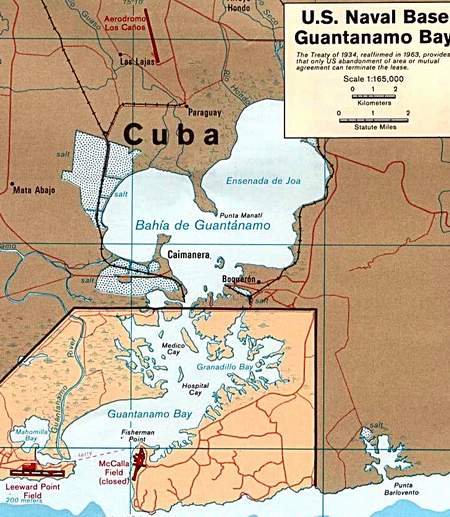
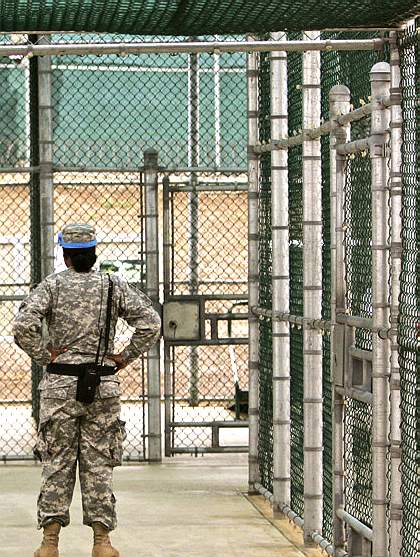
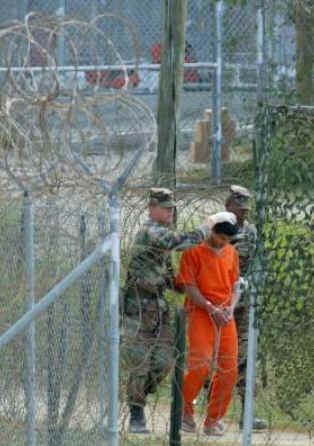
Guantanamo Bay Prison, Update
Today we talk with Emi MacLean, staff attorney for the Center for Constitutional Rights to get an update, an impression of where things stand with Guantanamo Bay prisoners, their status of Habeas Corpus, and the Obama administration’s position. There are also 17 innocent Chinese muslims called Uighurs asking, again for their release. Our guest Emi MacLean has worked with the Guantánamo Global Justice Initiative and other forms of executive detention, including secret prisons and transfers to torture.
Attorney Emi MacLean:
- More Guantanamo prisoners have left in the last weeks of the Bush Administration then the first 100 days of the Obama Administration.
- 240 people at Guantanamo right now. Approximately, 20 Guantanamo prisoners will face any prosecution.
- We’ve held more than 775 people at Guantanamo
- The people at Guantanamo right now are not there because of some greater threat assessment, they are there because of their country of nationality.
- Almost all the Europeans were released early on, almost all the Yemenis remain behind.
- A federal district judge ordered the release of the Uighers last October, the Bush Administration challenged the release.
- When we asked the Obama Administration to drop the challenge, they have yet to do so.
- I remember seeing civil liberties groups celebrating the executive order calling for the closure of Guantanamo in one year. But nothing has really changed for the reality of those men in Guantanamo. This is a consistent devaluation of the life of the men imprisoned there.
- We’ve seen the Obama Administration lawyers refuse to back away from the Bush Administration’s position on states secrets.
- It’s very hard for people to give up power.
- What makes our work difficult, is that it usually takes a couple of weeks for our communications to clear. The communication between counsels on what the Guantanamo conditions are.
- The Obama Review Team determined that the conditions at Guantanamo complied with Geneva Convention, which was certainly not what we were hearing and certainly not what we were seeing.
- The overwhelming majority of the men at Guantanamo were still in brutal conditions of solitary confinement and still reporting severe psychological and religious abuses at Guantanamo.
- No middle ground, these men should be tried or released.
Guest – Attorney Emi MacLean has worked at the Center for Constitutional Rights (CCR) with the Guantánamo Global Justice Initiative (GGJI) since June 2006. She works on issues related to Guantánamo and other forms of executive detention, including secret prisons and transfers-to-torture. She helps coordinate the pro bono attorneys representing the hundreds of men still detained at Guantánamo and supports CCR’s direct representation of a number of current detainees.
In addition, Emi is involved in civil actions brought on behalf of former prisoners released from Guantánamo (Rasul v. Rumsfeld and Celikgogus v. Rumsfeld) and actions under the Freedom Of Information Act (FOIA) challenging the government’s refusal to disclose information about the NSA’s warrantless surveillance of Guantánamo attorneys (Wilner v. NSA) and the CIA’s secret detention program (Amnesty International, CCR, et al. v. CIA). In addition to direct litigation, Emi’s work with CCR includes legislative and international advocacy.
Emi has previously worked or volunteered with the United States Senate Judiciary Committee, Center for Justice and International Law (CEJIL), Human Rights First, and the American Civil Liberties Union (ACLU). Prior to law school, Emi worked with South Africa’s National Association of Democratic Lawyers (NADEL), and Médecins Sans Frontieres (Doctors without Borders). Emi graduated magna cum laude from Harvard College and Georgetown University Law Center.
———————–
Afghanistan War, Civil Liberties, Criminalizing Dissent, Habeas Corpus, Human Rights, Surveillance, Targeting Muslims, Torture, Truth to Power
Podcast: Play in new window | Download
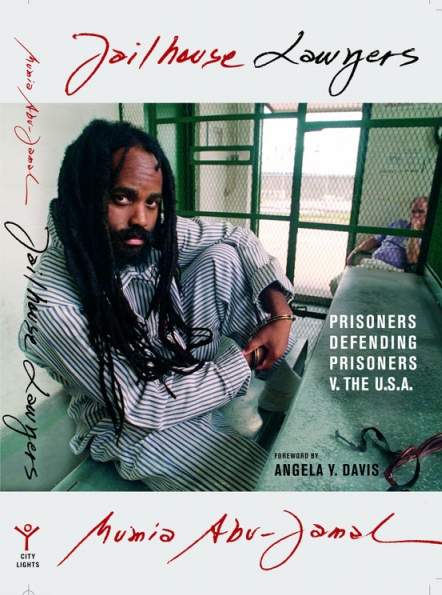

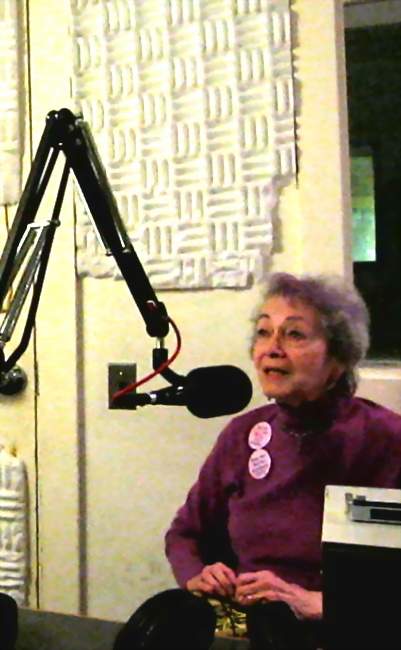
Frances Golden: Jailhouse Lawyers, Prisoners Defending Prisoners Against the United States of America by Mumia Abu Jamal
Frances Golden joins us today to discuss a very well known political prisoner, as we continue our political prisoner series based on the book Let Freedom Ring. Frances is the literary agent for Mumia Abu Jamal. Mumia as many know, was convicted and sentenced to death for the 1981 murder of police officer Daniel Faulkner. Mumia was a Black Panther Party activist, cab driver, and journalist. Since his conviction, Mumia has become an international cultural icon for political prisoners. A previous guest here on Law and Disorder, author/ journalist J. Patrick O’Connor who wrote The Framing of Mumia Abu Jamal, says the real shooter was Kenneth Freeman a business partner of Mumia’s brother. Freeman, was found dead in 1985, bound and cuffed in a Philadelphia parking lot.
We get a another perspective today from Mumia’s literary agent Frances Golden. Frances also visits six death row in a Pittsburgh maximum security prison. Jailhouse Lawyers, Prisoners Defending Prisoners Against the United States of America by Mumia Abu Jamal.
Frances Golden:
- Visiting death row inmates happened because I went to visit Mumia as a visitor.
- I had to become a member of the Pennsylvania prison society. 40 bucks a year you can see any prisoner anywhere.
- Now, because the PPS applications were flooded to see Mumia, they changed the policy that only Pennsylvania residents can become members of PPS.
- You have to see more than one prisoner as a PPS member. So, Mumia gave me names of others including Robert Lark aka Sugar Bear.
- I hope I don’t cry when I say this, out of the 6 death row inmates I see, 5 of them are innocent.
- You’re behind very thick glass, there are quarter inch thick screens on each side of the cell where your voice can travel through. It’s awful, insulting but it’s what exists on death row.
- I have a little book with their names in it, with 100 pages(of notes) between each name.
- The prison system is illegal and inhuman. The person who speaks most clearly about that is Angela Davis.
- One prisoner nicknamed Slim was on the streets of Philadelphia without a home at 10 years old. Never went to school, got in trouble ended up on death row. He learned to read in prison, he’s a phenomenal jail house lawyer.
- Two of the five could get out, that’s Sugar Bear and Osiris.
- I have a prisoner friend whose name is Russel Shoates. He will never be executed but he’s on death row because he escaped 3 times. Russell is shackled and tied to his waist. I dance with them and do yoga. I can’t do that with Russell. I asked the warden to unshackle him. This man is gentle, he’s small, he’s wickedly intelligent.
- Philadelphia, the most corrupt city in the United States, from beginning to end. –Judges lock up kids for kickbacks in Pennsylvania
Guest: Frances Golden, activist and literary agent for Mumia Abu-Jamal, Frances is a member of the Pennsylvania Prison Society and visits 6 death row inmates monthly.
————



Laura Whitehorn and Susie Day – Let Freedom Ring, A Collection of Documents From the Movements to Free US Political Prisoners.
Among the many contributors to the book Let Freedom Ring is revolutionary ex-political prisoner and native New Yorker Laura Whitehorn. Since the 1960s Laura was active in supporting groups such as the Black Panther Party, the Black Liberation Movement and was active with Students for a Democratic Society and the Weather Underground. Laura also worked to expose the FBI’s Counter Intelligence Program. Laura was arrested in 1985, convicted of the 1983 US Capitol bombing and charged with… “conspiracy to oppose, protest and change the policies and practices of the United States government in domestic and international matters by violence and illegal means.” She was sentenced to 20 years in prison, and was released August 1999 after 14 years. Laura lives in New York City and is active in a wide range of progressive issues.
Laura’s partner Susie Day, activist, writer and contributer to Let Freedom Ring also joins Law and Disorder hosts in the studio.
Laura Whitehorn:
- I’m in my sixties now, I was moved by the Black Liberation struggle and the struggle of the Vietnamese people against the United States.
- But I ended up spending years in prison later, in a case called the conspiracy case and our indictment was a thing of beauty – using the words violent and illegal means. It was a series of bombings of buildings. No one was ever hurt, great care was taken. One of the buildings was the U.S. Capitol.
- But in that period in 1988, we were in the DC jail for 3 years and it was the beginning of the huge epidemic of AIDS in Washington DC. It was a time of absolute fear, stigma, no drugs to treat HIV, and so we started to learn about HIV and did counseling, almost all the political prisoners had done that. This is because AIDS is huge in prison. A quarter of the people with AIDS in this country go through the prison system at some point.
- The fact that the government says there are no political prisoners, it’s a denigration of everything that you stand for. So, it was important that we had a lot of support.
- There’s a great interest in the sixties movements, the movies and books etc, but that doesn’t translate into the willingness to say enough is enough. People have been in jail since the late sixties and early seventies. How much time do you have to serve in this country, what kind of country do we have?
- In Europe the maxium is 20 years, sometimes they go farther. That’s a life sentence in Europe, but here, you could have saved the warden’s life but if you were a black panther and go to the parole board, they say you can’t get out.
- We have Obama, but the same justice system. We have to fight for a new justice system. What happens to political prisoners will happen to everyone else. We were held in preventive detention now everyone knows what it is.
- The book is a guide in how to raise these cases, who these people are, what kinds of organizations are out there. What can people do? The Jericho Movement
Susie Day:
- Before I met Laura Whitehorn, I was sort of intrigued by all the compromises most of us make everyday, for decades. We cut corners everyday to go to our jobs, to raise kids, to pay the rent, and we support involuntarily things that we abhor. So, I was interested in people who did not compromise. Who lived underground, who would go to extremes of giving up their lives of basic middle class educated comfort. . .and give up their identities to fight an establishment that made it so easy for everyone else to just get along.
Guest: Laura Whitehorn – revolutionary ex-political prisoner and native New Yorker Laura Whitehorn. Since the 1960s Laura was active in supporting groups such as the Black Panther Party, the Black Liberation Movement and was active with Students for a Democratic Society and the Weather Underground. Laura also worked to expose the FBI’s Counter Intelligence.
Guest: Susie Day lives in New York City where she writes a humor column for feminist and gay publications. She has also written on U.S. political prisoners and labor issues and thinks her girlfriend, Laura Whitehorn, is hot stuff. Can’t get enough of Susie? Read other pieces by Susie Day in MRZine: Susie Day, “Fugitive Offers Reward for Rumsfeld’s Capture” (22 July 2005); “Street Life of a Mad Activist” (28 July 2005);
—
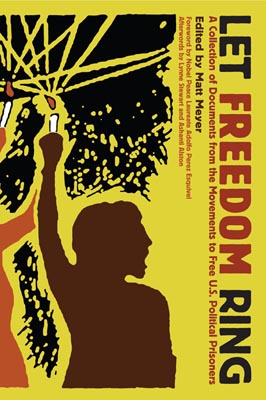

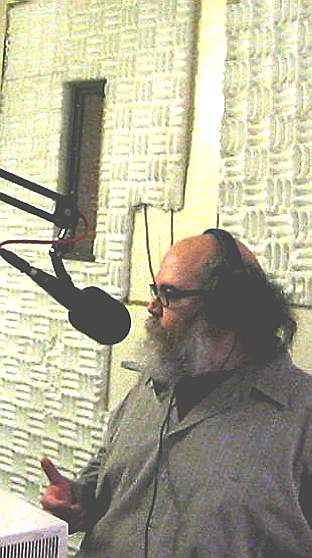
Matt Meyer – Let Freedom Ring, A Collection of Documents From the Movements to Free US Political Prisoners.
New York based educator and activist Matt Meyer. Matt is the editor of several books including the recently published Let Freedom Ring, A Collection of Documents From the Movements to Free US Political Prisoners. – The book nicely pulls together two decades of essays, interviews and resolutions of US political prisoners. These are the voices and intimate writings of those who have challenged the US empire from within, Black Panthers, Puerto Rican independentistas, white anti-imperialists, environmental and animal rights militants and Arab and Muslim activists. Meyer is a former public draft registration resister and chair of the War Resisters League.
Matt Meyer:
- We wanted to bring awareness to that yes, there are political prisoners in the US.
- There’s been a history to support those movements and free them.
- This book focuses on the last 25 years as a key era that took us through the late sixties and seventies of social change.
- The majority of peoples that have been in prison come from the black civil rights liberation movement, come from the American Indian Movement, come from the Puerto Rican and Chicano movements and come from some white allies and supporters.
- Political prisoners are in jail because of the ideas they’ve had as much as the acts they’ve committed. They’re political actions and beliefs and who are in jail 20, 30 years, incredibly long sentences and harsh conditions.
- It is also a collection of documents from the movement to free them. For example from the Puerto Rican movement. We have a collection of documents that began to help free 12 Puerto Rican political prisoners – this shows how this came through by a combination of grassroots support and international pressure.
- This book says to activists and all readers that we can build upon the strategies that have been used in the last 20 years. We can look at some of the documents and get a sense of how to use these strategies today to help not only political prisoners but prisoners in the ever increasing US prison system. There is a growing sense that we should all pay more attention to these folks who are languishing in jail.
- The fact that the information in this book was not readily available, it was scattered here and there. This volume was designed as a tool with the hope to spark new movements.
- What can people do? The Jericho Movement
Guest: Matt Meyer – Founding PJSA Co-Chair along with USF Dean Jennifer Turpin, Meyer has long worked to bring together academics and activists for lasting social change. A former public draft registration resister and chair of the War Resisters League, he continues to serve as convener of the War Resisters International Africa Working Group. With Bill Sutherland, Meyer authored Guns and Gandhi in Africa: Pan-African Insights on Nonviolence, Armed Struggle and Liberation, of which Archbishop Desmond Tutu wrote, “Sutherland and Meyer have looked beyond the short-term strategies and tactics which too often divide progressive people.
—————————————
Afghanistan War, Civil Liberties, Criminalizing Dissent, Extraordinary Rendition, Guantanamo, Habeas Corpus, Human Rights, Iraq Veterans, Iraq War, Prosecution of the Bush Administration, Supreme Court, Surveillance, Targeting Muslims, Torture
Podcast: Play in new window | Download
Updates:
————
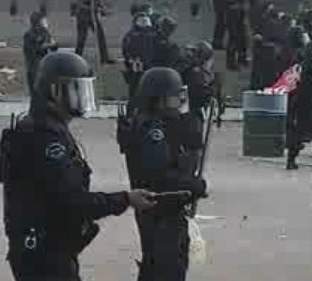
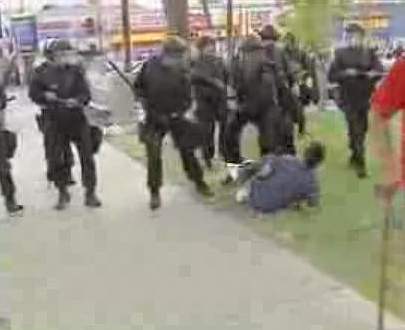

13 Million Dollar Payout in May Day LAPD Police Abuse Cases
In a landmark class action lawsuit settlement, the Los Angeles city council agreed to pay nearly 13 million dollars to those injured or mistreated in the 2007 May Day demonstration in MacArthur Park. As the march ended, LAPD riot police were filmed by camera crews using excessive force, firing rubber bullets and striking people with batons. Dozens were injured in the melee and the footage was seen around the world. The 13 million dollar settlement was part of a larger portion of nearly 300 May Day claims.
Carol Sobel:
- There was an immigrants rights march in MacArthur Park in Los Angeles on May 1st 2007, there has been for the last 7 years. The police didn’t want to give the group a permit to march in the streets.
- There are about 20 lawyers on this case, the National Lawyers Guild, the Guild’s Police Accountability Project and MALDEF, the Mexican American Legal Defense Education Fund.
- As around 10 thousand people approached the park, police “forgot” to direct people into the park.
- The rally was at the Northwest corner of park, so marchers had to cross an 8 lane highway that divides the park. This created chaos of which the problems arose.
- There was no instruction, people didn’t know where they were supposed to go.
- Then people got near police on motorcycles, they used their motorcycles to hit protesters. This was happening as an Aztec circle dance performance closed the march and opened the rally.
- Some protesters through trash, plastic water bottles at police. It was heard that the police said “We need to get rid of these people now.” Police were not giving orders to disperse, they simply said “move”.. to the 10 thousand people in the park.
- The officers were speaking only English, the crowd spoke almost all Spanish.
- Families had no idea why the police were coming with riot gear. While police were saying to move, people were thinking, “well I didn’t do anything wrong, they could’nt be talking to me.”
- So officers began knocking people down and hitting people, firing pellets, it was total chaos.
- 140 rounds of less lethal munitions were randomly fired into the crowds.
- The police report also stated there was no probable cause, no reason to go after the marchers.
- Lesson: It’s very difficult to change the culture of a police department. The police department can’t engage in this behavior, because we can’t afford it as a city.
Guest – California civil rights attorney Carol Sobel, who represented some of the injured. In 2000 Carol was struck by police pellets while serving as a legal observer during the Democratic National Convention.
———————–



Nora Eisenberg: When You Come Home
We’re pleased to have with us Nora Eisenberg, she’s the author of the recent book When You Come Home. It is a powerful novel that acknowledges the physical and psychological effects of veterans returning from Operation Desert Storm-The Persian Gulf War (2 August 1990 – 28 February 1991). In this beautifully written ant-war fiction, Nora delves into the corrosive effects post war combat has on the families and communities that are called on to nurture veterans returning home. Mimi is the main character who’s husband was killed in Vietnam, her 20 year old son Tony, a marine reservist, has returned from the Gulf War and there’s Tony’s childhood sweetheart, Lily who was raised by Mimi after her parents disappeared.
One book review describes When You Come Home this way: “In 1991, troops sent to Iraq for the first Gulf War returned home with a litany of physical, neurological, and psychological symptoms that collectively became known as Gulf War syndrome, a subject seldom dealt with in works of fiction. Eisenberg poignantly demonstrates that casualties of war occur both on and off the battlefield and ironically illustrates the vivid consequences when those in charge of veterans’ postwar care fail to meaningfully “support our troops.”
Nora Eisenberg:
- The First Gulf War – “The Good War”, 5 weeks of censorship and fabrication. Fabricated by a Washington based PR firm – Hill and Nolton. The campaign was headed by Craig Fuller. Fuller was also Chief of Staff for George H.W. Bush. Fuller took charge of the campaign to impress the public of what villians the Iraqis were.
- The firm brought this young girl to testify in front of a Congressional Committee – She claimed to work at a maternity ward in Kuwait. “The mean Iraqi soldiers” came in and hurled nearly 300 babies from their incubators and were left to die on the floor.
- This young girl was part of the Kuwaiti Royal Family, her father was Washington / Kuwait ambassador.
- All part of a 10 million dollar PR campaign with Hill and Nolton.
- Aside from the no-fly zones and sanctions, the deaths of Iraqis were massive and continuing.
- I’ve been following the deteriorating health system in Iraq and the rise of disease leading to the deaths of 2 million Iraqi children.
- I started writing this book with the “bad” war looming and with a sense that the ’91 war wasn’t over at all.
- I thought, are we going to kill millions again and get off scott-free, does it really work that way?
- Gulf War Illness, even among progressive people, there remains very little awareness of what this disease is. It attacks the respiratory system, the nervous system, it’s a neuro-toxic event.
- These soldiers got sick, immediately. Some say they got sick after swallowing an anti-nerve gas pill.
- When they were around the insecticides that were soaking the tents, they felt sick immediately, vertigo, stomach cramps.
- The soldiers loved ones, pets and wives coming down with similar symptoms, by proximity.
- It’s taken almost 20 years for Congress to say what the veterans already knew, that they were poisoned.
- A report delivered by high profile doctors at Roberta White say the soldiers were exposed to neuro-toxins. These were not neuro-toxins from Saddam Hussein.
- Those are main culprits, there are other terrible exposures that came out in a report last November.
- Such as the exposure to sarin in a weapons depository that affected 2-3 hundred thousand US soldiers.
- Nearly 15 thousand have died from Gulf War Illness. We have nearly 400 thousand US soldiers coming back as patients / nearly 40 percent are psychiatric patients.
Guest – Nora Eisenberg, New York City novelist and professor of English at the City University of New York (LaGuardia) and directs CUNY’s Faculty Publications Program. The War at Home ws a Washington Post Rave Book of the Year for 2002 and Just the Way You Want Me was awarded the 2004 Gold Prize in General Fiction from Foreword, the weekly of independent publishing. Her short stories, essays, and reviews have appeared in The Village Voice, Partisan Review, the LA Times, Tikkun., and numerous anthologies.
——————————————————–
Afghanistan War, Civil Liberties, Extraordinary Rendition, Guantanamo, Habeas Corpus, Human Rights, Iraq War, Supreme Court, Surveillance, Targeting Muslims, Torture, Truth to Power
Podcast: Play in new window | Download
The First 100 Days – Part 3

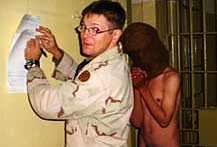

Private Military Contractors – Susan Burke
We go now to look at the abuse of force by Private Military Contractors and their role in illegal torture tactics and interrogation. In one case currently in litigation, four former Abu Ghraib detainees are suing two U.S. military contractor corporations and three individual contractors. The four were wrongly imprisoned, tortured and later released without charge.
According to the complaints, the defendants abused detainees physically and mentally and then destroyed documents, videos and photographs; prevented the reporting of the torture and abuse to the International Committee of the Red Cross. They actually hid detainees and other prisoners from the Red Cross; and misled non_conspiring military and government officials about the state of affairs at the Iraq prisons.
The defendants are CACI International Inc. and CACI Premier Technology, Inc., of Arlington, Va.; L-3 Services Inc., an Alexandria, Va.-based division of L-3 Communications Corp. and three individual contractors, Adel Nakhla, of Maryland, Timothy Dugan, of Ohio, and Daniel Johnson, of Seattle.
Susan Burke:
- Blackwater case pending before judge reggie walter in district of columbia federal court.
Nassir massacre case
- representing the families and people injured in that massacre. in the meantime the justice dept is looking into indicting blackwater soldiers
- Titan and CACI International Inc
- The CACI International Inc case on interrogation, the court says that this interrogation company could be liable because they exercised corporate control over the interrogators.
- The same court said the translator company L3 could not be held liable because they turned over the translators to the military.
- There are appeals on both issues, they’ve been briefed and are waiting for oral arguement.
- during the appeals, Susan’s lawfirm has been contacted by many additional victims.
- “As I litigate these cases, it struck me that we really need to stop these corporations from acting as if they are the United States.
- All these companies are trying to wrap themselves in sovereign immunity, wrap the flag around themselves. and say that we simply can’t even look at what they did.
- One of the companies CACI International Inc sued for defamation, because somebody dared to criticize them. Rhandi Rhodes the talk show host.
- I would like to see immediately a real push to make the government’s position real clear.
- Corporations are not the United States and should not automatically be entitled any type of immunity.
- The Bremer order which has been in effect has insulated them from being sued in Iraq.
- As a result the Iraqis who want to obtain justice have to come to the United States.
- By allowing there to be a derogation to evade, the laws in black and white that are on the decks right now that say,
you can not hire soldiers.
- By the fact that those laws are being ignored and we’re increasing our firepower with mercenaries, the current administration has essentially bought its way from having to draft people.
- Its a troubling thing because we’ve created a class of mercenaries.
- They define themselves as mercs
- They are soldiers for hire, they’ll fight for anyone who pays them.
- That’s why we have to clamp down and enforce the law against the existence of mercenaries,
- We’ve got to take away the veneer of legitimacy, what the defense industry has thrown over the illegal mercenary industry.
—————————————-
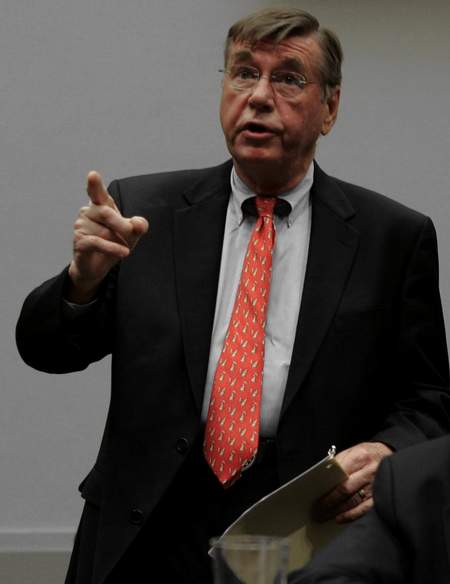
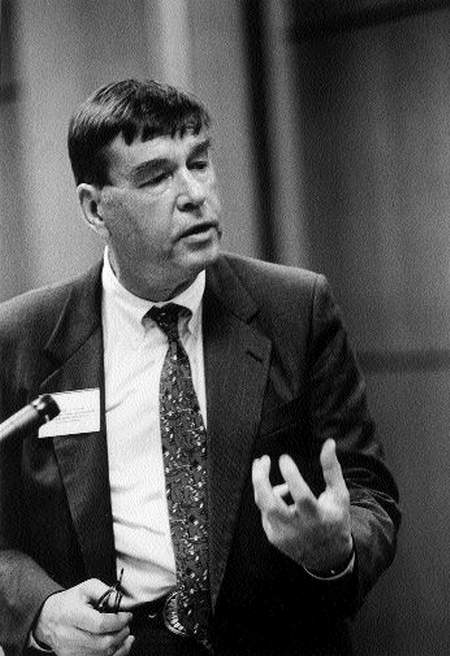

Wide View – Research Professor of Law, Michael Tigar
Michael Tigar is an expert in Constitutional Law and the Supreme Court. He has represented Terry Nichols of the Oklahoma City Bombing, Angela Davis, and Lynne Stewart. Tigar outlines several steps the Obama Administration must do to turn back the major breaches in U.S. civil liberties.
Michael Tigar:
- There is now a systematic breaking down of all barriers against government intrusion into the private lives of people.
- Alien Enemy Combatants: A creation of a new class of people who are thought to be utterly right-less, both as to whether they can be detained, the conditions of their detention, and the manner in which they can be held and interrogated.
- Meanwhile, we have legal fictions such as the Vice President saying he’s neither a member of the executive or legislative branch, and therefore being subject to the rules of both is subject to the rules of neither.
- We have justice system staffed with people whose only qualification is their asserted ideological purity.
- We have two aggressive wars, all done to the tune of the most massive federal debts in history.
- This, accompanied by the largest transfer of wealth from the poor, and working class to the already wealthy, coupled with the dismantling of regulatory barriers of how greed and avarice operate.
- It is the lack of any significant organized resistance from legislators, and with some few bright exceptions, judges and lawyers that define for us the task that lies ahead.
- Eric Holder, a good lawyer, was among the group of people in the Clinton administration that even though they had all the evidence, that they would not prosecute Pinochet.
- National State Secrets: the case of journalist Quentin Reynolds who took a ride on an Air Force jet and it crashed, his widow sued under the federal tort claims act saying that she thought there was negligence. The United States convinced the Supreme Court that to disclose the reasons why that plane crashed might involve state secrets, and that she should not be able to sue.
- Sixty years later the maintenance file on that plane was on unsealed. It turned out that it was a routine maintenance error that caused the crash. Behind the curtain of states secrets is illegality and mendacity.
- How many years did it take to get Pinochet for any kind of proposed criminal accountability, almost 20, because of states secrets.
- The tort system, that is the way we enforce rules about safe products, it’s the way that we enforce the rules about the toxic substances that poison people, it’s the way that we deal with the kleptocracy that rules wall street.
- It’s so well tested – Marbury v Madison 1803 – Chief Justice Marshall said that he could decide a case was unconstitutional.
Guest – Michael Tigar, a criminal defense attorney who has represented some of the country’s most controversial clients. He is also a member of the Duke University Law School faculty.
——–
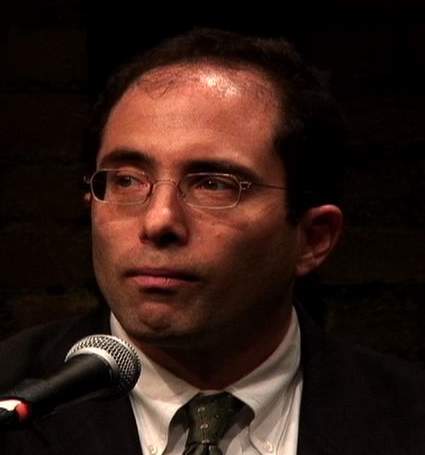
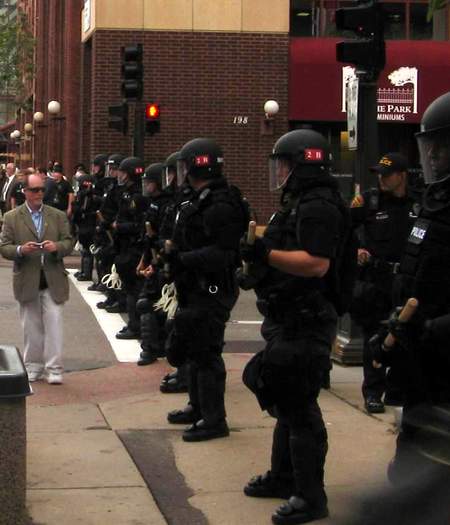
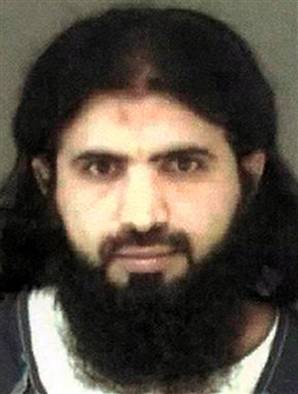
Jonathan Hafetz: Enemy Combatant:
In June of last year, an en banc Federal Appeals Court in Virginia ruled 5-4 that the Bush Administration could subject Ali Al-Marri to indefinite detention even though he was a resident of the United States. The court in the fourth circuit ruled that US residents could be locked up indefinitely as enemy combatants even though they were never charged with a crime. Al-Marri is the only enemy combatant currently in detention and without charges in the United States.
Jonathan Hafetz:
- Can the president declare legal residents including American citizens, enemy combatants, deprive them a right to a trial and hold them indefinitely.
- This, based on the idea that there is a global and never ending war on terror.
- Though on sovereign soil, no right to habeas corpus. He was declared an enemy combatant, the case was lost in an embank in the fourth circuit
- Why is this case so critical to liberty in the United States . . . ?
- The five judges who ruled against the case, said essentially that there must be this power to effectively detain people in the United States to prevent terrorist attacks.
- Ruling: the president can label legal residents including American citizens an enemy combatant in the United States, without a trial, no habeas, hold them indefinitely.
- It’s the idea of the president to use the military to seize people including citizens from their home or places of work.
- A very dangerous power to allow any president to have, it corrupts the justice system, it can be used as a weapon,
- Seven years of these cases of assertion of executive power, and the courts have not answered this fundamental basic question, who can be detained by the military, who is a soldier and who is a civilian?
- All that is stated is that if someone picks up a weapon on the battlefield, that person can be a soldier, but in the most extreme cases in the war on terror – – such as being picked up in the United States as a soldier in the extended geographic concept of the war on terror – – the courts have not grappled with whether there is habeas in those cases.
- Even the judges who ruled against us did say that it included American citizens.
Guest – Jonathan Hafetz, Staff Attorney at the American Civil Liberties Union, National Security Project.
———————————————–


War Powers – Jules Lobel
Co-host Michael Ratner and Jules Lobel have litigated 14 cases concerning the power to go to war. “The least effective area of law is holding back the use of war powers.” In the Bush Administration, there was an excessive use in the power to go to war, in Afghanistan, Iraq and around the world. Jules Lobel has testified in front of Congress recently to get a more restrictive law passed by Congress that would actually hold back presidential war making. Unfortunately, Congress passed the Authorization To Use Military Force to go to war on executive order in the name of national security.
Attorney Jules Lobel:
- The president shall not start a war without congressional approval.
- That would not only reverse what the position was in the last 8 years, but the last 50 years.
- For example Iran, there’s all this speculation that the US will attack Iran.
- I think if Obama says I will not attack Iran without Congressional approval, a signal then to Iran that the US will have to fiddle with Congress and no immediate threat.
- The point is the president should not be making this decision on his own!!!
- Presidents for the last 50 years have asserted the president has a right to use US force abroad,
not in self defense but when some vague notion of our national security is at stake.
- I think Obama should say that we will clearly reverse this.
- What the Bush and Clinton administration which is we can go to war in violation of the UN charter
- The US has signed to agree and abide by UN Charter that only allows the US to go to war in two circumstances.
- One is self defense of an attack against us. Second is we think there’s a grave threat of national security or world peace.
- We have a right to go the security council and get them to authorize, and we did so when Iraq attacked Kuwait.
- Ok for Obama administration to continue to use force in Afghanistan under constitution and UN charter?
- Congress authorized a very narrow use of force against Al-Qaida
- Still we have to decide, whether or not its legal, the best policy of approach,
- The model is focused on war and not criminal justice.
- Unfortunately they have a narrow authorization, which the Bush administration has argued for a much broader
- I don’t think they have authorization to use force against people in the United States
- Jules: when I testified before Congress I said we should put in a war powers act that doesn’t violate our treaties.
- The restraints on the dogs of war shouldn’t be just from the US Congress, because they often go along with unreasonable executive persuasion, such as the Gulf of Tonkin and the AUMF
- There has to be enforcement at least of the International treaties, even though the political elite have ignored it.
- Jules: i think the legislation that I testified on of possibly getting through with some amendment or beefing up the war powers act and making it effective.
- This was mostly done in secret, secret memos, I think Obama should publish the secret memos.
- We need to publish and expose what was done in secret, including memos written by the DOJ, which should never be secret.
- Legal memos: Obama can de-classify this huge slew of material that would indicate just how far off the rails the Bush administration was.
- Yes on prosecution to bring accountability, there is a very basic step preliminary to building evidence and cases, you have an institutional precedence to follow executive authority.
Through the U.S. Center for Constitutional Rights, Jules Lobel has litigated important issues regarding the application of international law in the U.S. courts. In the late 1980’s, he advised the Nicaraguan government on the development of its first democratic constitution, and has also advised the Burundi government on constitutional law issues.
Professor Lobel is editor of a text on civil rights litigation and of a collection of essays on the U.S. Constitution, A Less Than Perfect Union (Monthly Review Press, 1988). He is author of numerous articles on international law, foreign affairs, and the U.S. Constitution in publications including Yale Law Journal, Harvard International Law Journal, Cornell Law Review, and Virginia Law Review. He is a member of the American Society of International Law.
———————————————————————-
Afghanistan War, Civil Liberties, Guantanamo, Habeas Corpus, Military Tribunal, Targeting Muslims, Torture, Truth to Power
Podcast: Play in new window | Download
Host Updates:
—
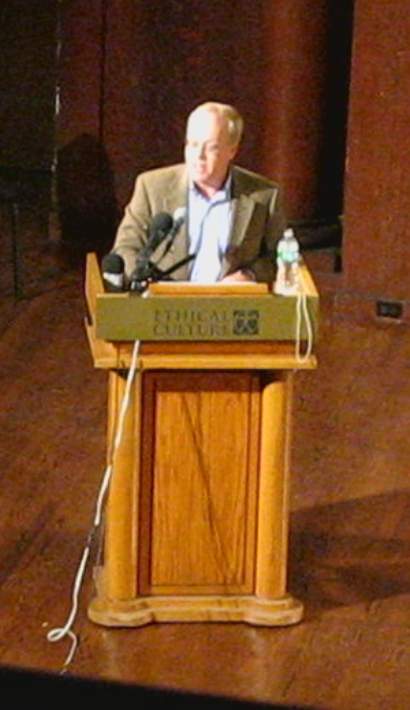
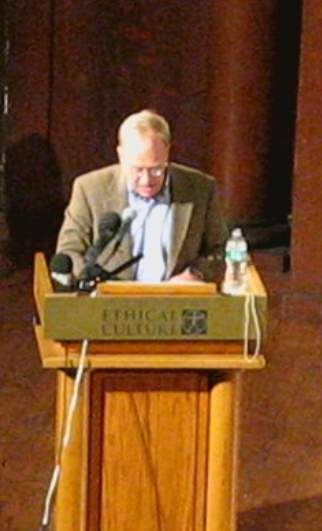
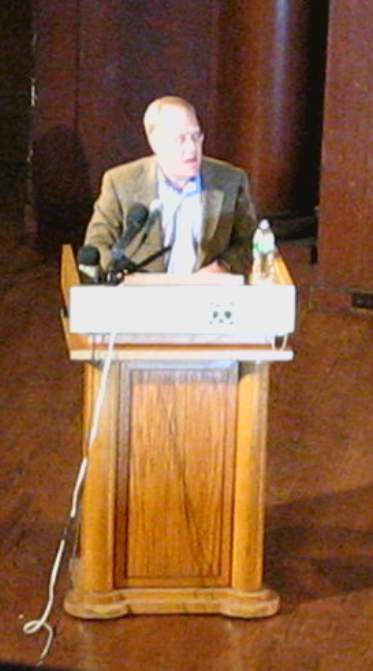
Stop The Israeli Massacre in Gaza – Speech by Chris Hedges
On Tuesday, Jan 13th, 550 people attended a Revolution Books Emergency Town Hall Meeting held at the Center for Ethical Culture in Manhattan. The meeting demanded a stop to the Israeli massacre in Gaza, and condemned the U.S. role in this war crime. The emergency meeting was an important challenge to people to understand the horrific situation in Gaza, the causes and implications, and to act.
Chris Hedges:
- Those who orchestrate these sieges, do not grasp the terrible rage born of long humiliation, indiscriminate violence and abuse.
- 71 percent of children interviewed at a school in Gaza last year, said they wanted to be a martyr.
- The refusal of our political leaders from Barack Obama to all but five members of Congress and the major media to speak out in defense of the rule of law and fundamental human rights exposes our cowardice and hypocrisy.
- We have become monsters, militarized bullies, heartless and savage. We are a party to human slaughter.
- We forget that the innocent who suffer and die in Gaza are a reflection of ourselves. Of how we might have been if fate, time and geography had made the circumstances of our birth different.
- The lesson of the holocaust is not that Jews are eternal victims. The lesson of the holocaust is when you have the capacity to halt genocide and you do not, no matter who carries out that genocide or who it carried out against, you are culpable.
- We are very culpable, the F-16 fighter jets, the Apache attack helicopters, the 250lb GBU39 Smart Bombs are all part of the 3 Billion dollar a year aid we give to Israel.
- But our indifference to senseless killing is expected, we kill women and children on a vaster scale in Iraq and Afghanistan.
- Governments distort and manipulate facts, knowing that propaganda is a vital instrument in war.
- Lies permeate absurd reports like the front page NY Times story titled A Gaza War Full of Traps and Trickery.
- In this story unnamed Israeli officials justify bombing school because Hamas was firing mortars near the building. They offered a photo as proof. The photo was taken a year ago.
- Reporters are asked to abandoned their trade and become stenographers.
- Using unnamed Israeli officials to report the news is the poison of American journalism.
- Gaza will be ruled in the future by warlords, clans and antagonistic mafias. Out of that power vacuum will rise a new generation of angry Jihadists.
Speaker – Chris Hedges, author of many books specializing in American and Middle Eastern politics and society. He spent nearly two decades as a foreign correspondent in Central America, the Middle East, Africa and the Balkans and right now, he’s a senior fellow at The Nation Institute in New York City and a lecturer in the Council of the Humanities.
—–

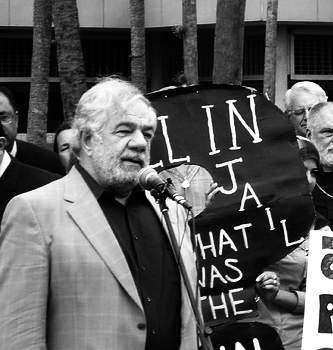
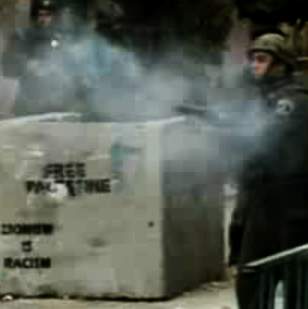
The World Turns Away From Gaza: Abdeen Jabara
In the last few weeks, the focus has been on the humanitarian crisis and military devastation Gaza. We’re joined by Abdeen Jabara, board member of the Center for Constitutional Rights, an attorney and the former head of the Arab-American Anti-Discrimination Committee. Abdeen Jabara gives us his perspective and reaction to the killings of thousands and damage in Gaza.
Abdeen Jabara:
- 4100 Houses Destroyed, 17 Thousand Houses Damaged, 25 Mosques Destroyed
- 31 Security Headquarters, 16 Ministry Buildings, 1500 Commercial Facilities
- “The Palestinians must made to understand in the deepest recesses of their consciousness that they are a defeated people.” – Israeli militant
- Attack Lebanon in 1982, the destruction rained down on that country drove the PLO out of Lebanon in to Tunisia.
- What led to the Oslo Accord, then they split the Palestinian people, classic colonial strategy.
- Its shocking to me how the world looked away as Israel slaughtered Palestinians.
- . . that there has not been more of an outcry from the Europeans.
- The Czech president of the European Union was very supportive of the Israeli bombardment on Gaza.
- Now the Europeans that say they want to build in Gaza, are adhering to Israel’s demand that none of this aid will go to Gaza that may aid Hamas.
- The Israelis moved to attack because they knew that Bush was a known quantity.
- Europeans are keeping a low profile on this, as economic pressure continues.
- Very few people understand that Gaza is a very large open air concentration camp.
- This was essentially a jail break on the part of Gaza, because they were being suffocated.
- More than 50 percent unemployment in Gaza, the conditions of life there are untenable.
- Aside from Chavez and Boliva, the world looked away.
- I believe it’s difficult for secular people to grasp, they believe in individual rights, while the fundamentalism (in Gaza) is building.
- Hamas’ popularity is going to grow. I see a much more pronounced religiously motivated movement.
- There is a strategy to pit one group against the other to create chaos, as in what’s happening in Iraq.
- Perhaps if the chief architect of the Oslo Accords had not been assassinated, there could’ve been real progress.
- They want to divide the Palestinians and have Hamas stand in Gaza, impoverished.
- The attack on Gaza, the ferocity and to grind the Palestinians into the ground, will lead to a lot of repercussions in places all over.
- A lot of people do not want to talk about Zionism in the United States. It is alive and well.
- A lot of people talk about Israel as being post-Zionist, it’s not. It’s still in the process of inculcating the idea of the in-gathering of the exiles.
- Brett Stevens from Wall St Journal, will speak at 92nd Street Y titled, Why Zionism Has Become A Dirty Word.
- We have to talk about what Zionism is for people to understand the roots of this problem.
- Israel is no longer giving out the names of the Brigade Commanders in Gaza for fear they will be tried in an International Court
Guest – Abdeen Jabara. Jabara has campaigned for more than two decades against harassment and the infringement of Arab-American’s First Amendment rights. Amid this, he scored a signal victory in his own suit against the FBI for its years of surveillance and harassment of him. He has led and helped organize fact-finding missions to Lebanon and the Israeli Occupied Territories, most recently leading a delegation of American mothers and grandmothers to Qana last May after the Israeli massacre of civilians there.
——————————————————–









































